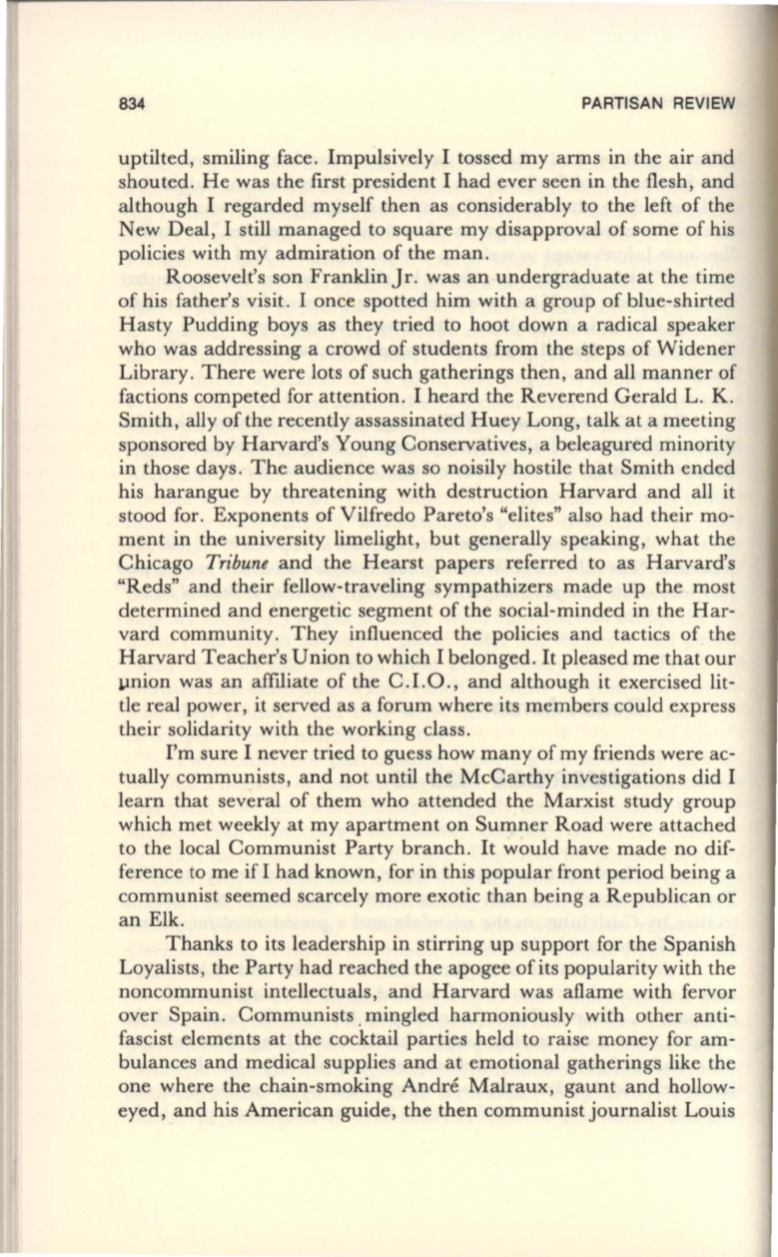
834
PARTISAN REVIEW
uptilted, smiling face. Impulsively I tossed my arms in the air and
shouted. He was the first president I had ever seen in the flesh, and
although I regarded myself then as considerably to the left of the
New Deal, I still managed to square my disapproval of some of his
policies with my admiration of the man.
Roosevelt's son Franklin Jr. was an undergraduate at the time
of his father's visit. I once spotted him with a group of blue-shirted
Hasty Pudding boys as they tried to hoot down a radical speaker
who was addressing a crowd of students from the steps of Widener
Library . There were lots of such gatherings then, and all manner of
factions competed for attention . I heard the Reverend Gerald L. K .
Smith, ally of the recently assassinated Huey Long, talk at a meeting
sponsored by Harvard's Young Conservatives, a beleagured minority
in those days . The audience was so noisily hostile that Smith ended
his harangue by threatening with destruction Harvard and all it
stood for. Exponents of Vilfredo Pareto's "elites" also had their mo–
ment in the university limelight, but generally speaking, what the
Chicago
Tribune
and the Hearst papers referred to as Harvard's
"Reds" and their fellow-traveling sympathizers made up the most
determined and energetic segment of the social-minded in the Har–
vard community. They influenced the policies and tactics of the
Harvard Teacher's Union to which I belonged. It pleased me that our
l).nion was an affiliate of the C.
I.
0., and although it exercised lit–
tle real power, it served as a forum where its members could express
their solidarity with the working class.
I'm sure I never tried to guess how many of my friends were ac–
tually communists, and not until the McCarthy investigations did I
learn that several of them who attended the Marxist study group
which met weekly at my apartment on Sumner Road were attached
to the local Communist Party branch. It would have made no dif–
ference to me if! had known, for in this popular front period being a
communist seemed scarcely more exotic than being a Republican or
an Elk.
Thanks to its leadership in stirring up support for the Spanish
Loyalists, the Party had reached the apogee of its popularity with the
noncommunist intellectuals, and Harvard was aflame with fervor
over Spain. Communists .mingled harmoniously with other anti–
fascist elements at the cocktail parties held to raise money for am–
bulances and medical supplies and at emotional gatherings like the
one where the chain-smoking Andre Malraux, gaunt and hollow–
eyed, and his American guide, the then communist journalist Louis


